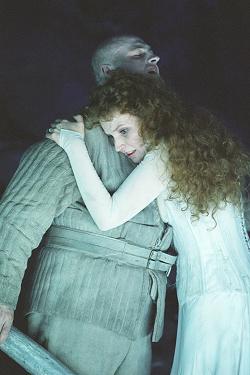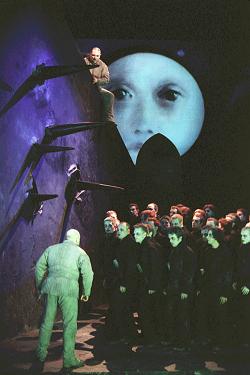|
<< -- 6 -- Roderic Dunnett UNALLOYED GENIUS

The Glyndebourne audience came quickly onboard, enchanted by the music
and playing alike before either of the women had even sung a note. Weber
avoids introducing his central female characters until a whole series of
largely male scenes, just as he delays Agathe and Annchen's appearance
in Freischütz : Moniuszko, possibly Weber-influenced, does the
same, and to similar fine effect, for Hanna and Jadwiga in The Haunted
Manor, Tchaikovsky (certainly Moniuszko-influenced) for Lisa and Pauline
in The Queen of Spades, and Janácek something not wholly dissimilar
in delaying the Kátya-Varvara scene in Kátya Kabanová.

Anne Schwanewilms (Euryanthe) with John Daszak (Adolar). Photo: Mike Hoban
|
Macfarlane's set changes (the massive, cumbrously revolving sets
occasioned one unscheduled total stoppage) were right at the heart of the
imagery. Not just for practical reasons, sometimes they are phased and faded
gradually into the next. The most ominous example was the deliberately preemptive
suggestion of the spiky Act III forest, which glowers onto the stage just
before the close of Act II. Equally aptly, the scene at Emma's tomb,
terrifyingly enacted, seems to anticipate the desolate outdoor feel of Act
III.

Pavlo Hunka as the villainous Lysiart (above) and John Daszak (left) as Euryanthe's betrothed, Adolar, whose rejection of Euryanthe the chorus now condemns. Photo: Mike Hoban
|
White-clad, with a whitish, almost pasty face picked out by blood-red
lipstick, Schwanewilms, with subtle movement and the graceful look of a
mouldering Van Eyck, already appears like sacrificial victim even before
she faces abandonment and death. 'Has innocence no voice?' her
Euryanthe inquires, amid the impenetrable hubbub of male affront. No reply,
because no-one can hear her. This Euryanthe is indeed a Desdemona, an Isabella,
an Imogen; and the female librettist, von Chezy, Shakespeare and Schiller-imbued,
by no means the incompetent textual seamstress she is normally, partly because
of her poetic and social aspirations, dubbed as.
Continue >>
Copyright © 28 July 2002
Roderic Dunnett, Coventry, UK
 RODERIC DUNNETT ON THE RESIGNATION OF NICHOLAS PAYNE
GLYNDEBOURNE FESTIVAL AND GLYNDEBOURNE TOURING OPERA WEBSITE
RODERIC DUNNETT ON THE RESIGNATION OF NICHOLAS PAYNE
GLYNDEBOURNE FESTIVAL AND GLYNDEBOURNE TOURING OPERA WEBSITE
|

